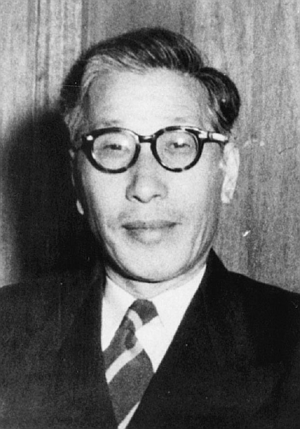Ho Chong facts for kids
Quick facts for kids
Ho Chong
|
|
|---|---|
|
허정
許政 |
|

Ho in the early 1950s, during his tenure as the mayor of Seoul.
|
|
| 6th Prime Minister of South Korea | |
| In office June 15, 1960 – August 18, 1960 |
|
| Preceded by | Ho Chong (Ministries involved) |
| Succeeded by | Chang Myon |
| 8th Mayor of Seoul | |
| In office 14 December 1957 – 11 June 1959 |
|
| Preceded by | Goh Chaebong |
| Succeeded by | Kim Heung Soon |
| Personal details | |
| Born | April 8, 1896 Pusan, Gyeongsang-do, Joseon Dynasty (now Busan Metropolitan City, South Korea) |
| Died | September 18, 1988 (aged 92) Seoul, South Korea |
| Political party | Democratic Party |
| Spouse | Baek Gui-Ran |
| Korean name | |
| Hangul | |
| Hanja | |
| Revised Romanization | Heo Jeong |
| McCune–Reischauer | Hŏ Chŏng |
| Art name | |
| Hangul | |
| Hanja | |
| Revised Romanization | Uyang |
| McCune–Reischauer | Uyang |
Ho Chong, Huh Chung, or Heo Jeong (Hangul: 허정; Hanja: 許政; April 8, 1896 – September 18, 1988) was a South Korean politician and Korean independence activist, who served as the sixth Prime Minister of South Korea during the country's Second Republic.
In 1960, he was an acting prime minister during the First South Korean Republic. In addition, he headed a caretaker government for a brief time following the 1960 April Revolution which overthrew the First Republic. Ho was also known by the nickname, "Uyang" (Hangul: 우양; Hanja: 友洋; literally "friend of the seas"), and an alternative name, Heo Sung-su (Hangul: 허성수; Hanja: 許聖洙).
Career
Ho Chong was born in Busan, South Gyeongsang province. His father, Ho Mun-il, was a wealthy merchant. In 1922, Ho went into political asylum, where he lent a hand to Syngman Rhee. From 1922 to 1936, Ho participated in Korean resistance movements. On September 2, 1945, he joined the Korea Democratic Party. In 1950, he was appointed to Acting Prime Minister and later in 1951, additionally was Minister of Health until 1952. From 1957 to 1959 he was appointed as Mayor of Seoul and was later dispatched to Japan as the South Korean special envoy to Japan. On April 16, he became Foreign Minister. On April 25, he was appointed Acting Prime Minister, and the following day President Syngman Rhee resigned. Ho Chong was additionally Acting President until August 18 of that year. On July 16, 1960, he was appointed as the 6th Prime Minister of South Korea, by the National Assembly. He remained Acting President of South Korea until succeeded by Yun Bo-seon on his election.
In 1919, he met Syngman Rhee in a Methodist church of Seoul. Since then and until 1960, Ho Chong was Syngman Rhee's enthusiastic follower.
See also
 In Spanish: Heo Jeong para niños
In Spanish: Heo Jeong para niños
- April 19 Movement
- Politics of South Korea
- History of South Korea
- Syngman Rhee
Site link
- Heo Jeong
| Political offices | ||
|---|---|---|
| Preceded by Chang Myon |
Prime Minister of South Korea (Acting) 1951 |
Succeeded by Chang Myon |
| Preceded by Baek Han Seong |
Ministries involved 1960 |
Succeeded by Ho Chong (6th Prime Minister) |
| Preceded by Ho Chong (Ministries involved) |
6th Prime Minister of South Korea 1960 |
Succeeded by Chang Myon |
| Preceded by Min Hye-Sik |
2nd Transportation Minister of South Korea 1948 - 1950 |
Succeeded by Kim Seok-Kwan |
| Preceded by Lee Yun-Young |
3rd Social Affairs Minister of South Korea 1950 - 1952 |
Succeeded by Choi Chang-Sun |
| Preceded by - |
3rd Government Services Minister of South Korea 1952 |
Succeeded by - |
| Preceded by Ko Jae-bong |
8th Mayor of Seoul City 1957 - 1959 |
Succeeded by Lim Heung-Soon |
| Preceded by Choi Kyu-Ha(Acting) |
5th Foreign Affairs Minister of South Korea 1960 |
Succeeded by Jeong Il-Hyung |

